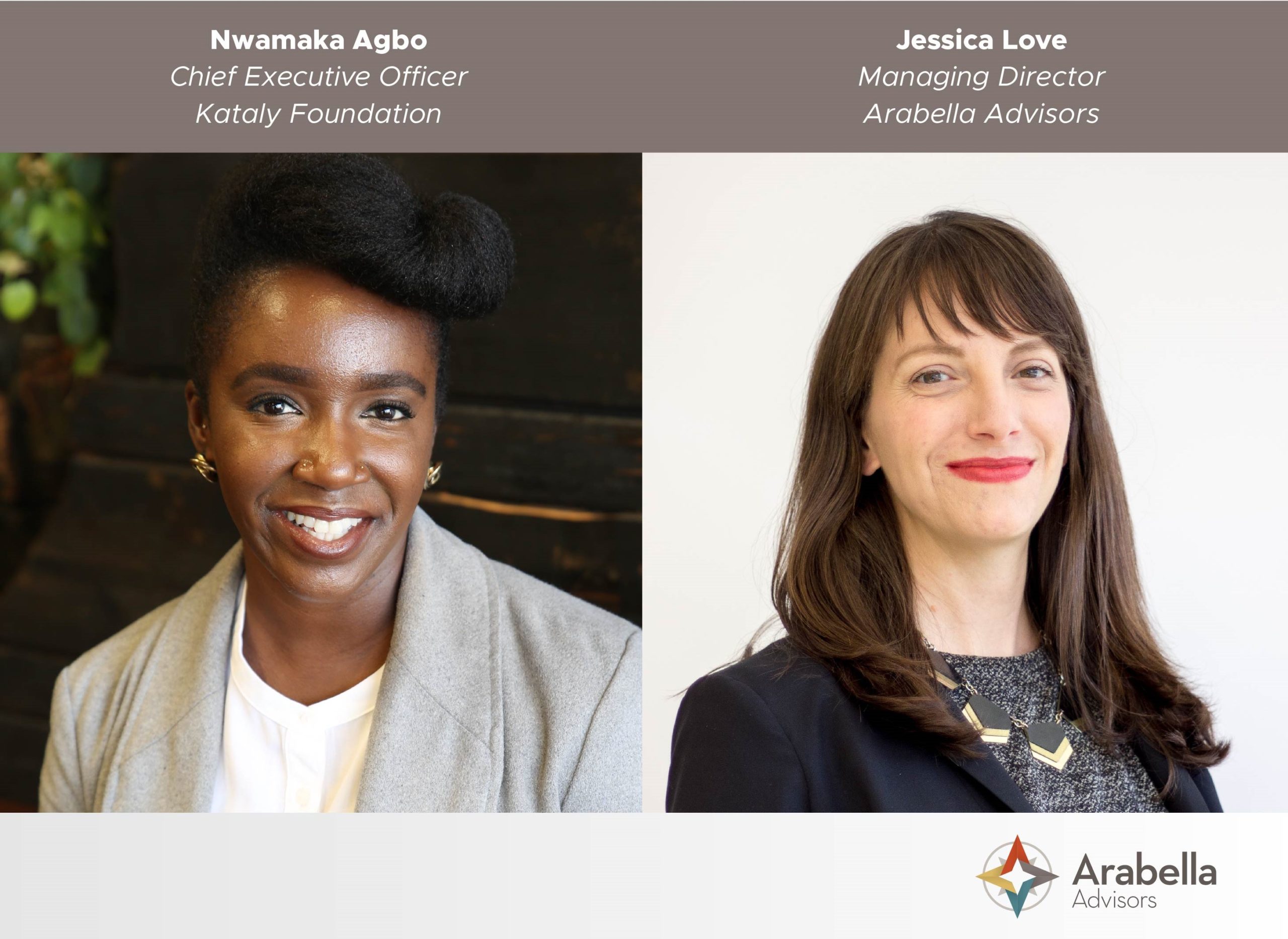Nwamaka Agbo and The Kataly Foundation

In the latest episode of Arabella Advisors’ podcast, Arabella Managing Director, Jessica Robinson Love spoke with Nwamaka Agbo, CEO of the Kataly Foundation. Here’s some of what Nwamaka had to share during their conversation:
“I would couch our entire conversation in the understanding that I come to this work as an organizer first and foremost. And one of the things that I observed early on in my organizing background, […] was that so much of the ways that Black, brown, Indigenous communities, communities of color, and those that are disproportionately impacted by a whole slew of systems, most of the ways that they have the tools to be able to live with dignity and autonomy is by pushing back against the forces that seek to oppress their communities.”
“I realized that [the tools communities have to use] are really limited. So much of those tools require Black, brown, Indigenous communities to give over or relinquish their governing power to other forces. I want to sit with the question, what are the ways in which those that are most directly impacted, or closest to the pain, are also those with solutions? How do we engage them not just as those with the solutions, […] but as the builders, designers, and developers of their community?”
“There was always a question of where would the resources come from. […] Restorative Economics brings together an understanding of the vision, how we actually start to support those that are directly impacted, and lifting up their solutions and designs and actually using them to implement how we transition out of an extractive and exploitative economy; and also recognizing that part of how we get there needs to be with the understanding of the need to redistribute resources back into those communities.”
“Restorative Economics was something that I designed for myself. It was something that I designed to support my consulting practice; and it was a way to signal to clients and organizations that wanted to work with me that ‘this is the work that I am up to in the world’.”
“The framework itself is rooted in a number of principles. But the key ones that I would lift up is that we seek to support community-owned and community-governed projects; those that are rooted in the social movements of their local communities. We want to support economic models that create shared prosperity.”
“We know, that as we are calling for the decolonization of philanthropy and as we are calling for an end to white supremacy, that unfortunately these systems are internalized within us as individuals and within philanthropy as a field. And so, our work every day has to be how are we challenging and questioning where and how those practices show up, and where and how we can do better.”
“Oftentimes, philanthropy tries to act or pretend that we don’t have power. There is a weird abdication of power that doesn’t serve anyone; it doesn’t serve our grantees; it doesn’t serve ourselves. But when we’re clear about where we have power, and how we are stewarding it, then we can recognize a level of responsibility of how we move.”
“We [the Kataly Foundation employees] come with an understanding of what does it mean to resource those who have been most directly impacted. Early on, and through my organizing work, I really came to understand and see the ways that typical policies and practices, if they are not intentional or specific and targeted about who they resource, continue to miss the Black, brown, and Indigenous communities of color. And that is because of the things we already know about systemic inequities and structural racism. So we need to be specific and clear about what we are trying to resource and the ways we are trying to resource them.”
“There is a gap in values and strategies [between the activists and community organizers who’s goal is to work themselves out of a job and philanthropy which seeks to exist into perpetuity] that we actually need to uncover. Sometimes the spend out conversation is a way that allows us the flexibility to align ourselves more directly with the goal of social movement and community organizers. If we understand that they are trying to work themselves out of a job, then it requires us to resource them in a way that we believe that they can win. Which may mean we have to really redistribute some of our resources.”
“One of the things that gives me hope is that, in the face of the continuing deployment of the stimulus funds and the infrastructure build that has just been announced, philanthropy has a really unique opportunity to do a lot of the capacity building and readiness on the ground that helps to support Black and brown communities to be at the forefront of securing these federal dollars that help to make possible so much of what they have been calling for. If philanthropy can be the first investors and supporters, we then make it possible for these communities that oftentimes get overlooked […] to have the capacity to secure their resources.”
“We need to, as a field, be more intentional about what it means to be organizers. If we can learn from some of the best, it means listening and providing the level of education, but it also means challenging. I would invite those that want to create this type of shift and change within their institution to learn and think and move like an organizer. And to have that level of intentionality in how we engage.”
To hear more insights, drawn from Nwamaka’s work as an organizer as well as her work as a CEO, and to learn more about what motivates her and keeps her in this vital work, listen to the full conversation Nwamaka and Jessica here.
